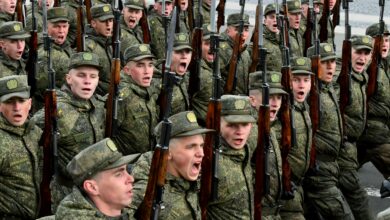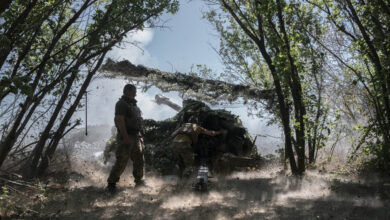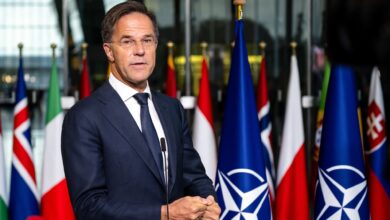
With each passing day, US headlines about Ukraine are becoming more and more alarming.
Talk of a looming Russian invasion has created the impression that a major conflict in Europe is imminent. However, this rhetoric appears to be one-sided. The same level of anxiety is not seen in Russia, and the lack of determined messaging from the Kremlin preparing the domestic populace for war likely indicates Moscow’s actual plans.
While the Russian military buildup along its border with Ukraine has raised tensions in Europe and a joint exercise with Belarus has only exacerbated fears, the Kremlin continues to deny it is planning an attack.
“There won’t be a war as far as it depends on the Russian Federation, we don’t want a war,” Russian Foreign Minister Sergei Lavrov said in an interview on January 28. “But we won’t let our interests be rudely trampled on and ignored.”
Public Opinion
Even in Russia, where President Vladimir Putin has been in power for more than two decades, the use of military force without public support could entail heavy political costs, so public opinion is not something that can be completely excluded from calculations.
TV remains the main source of news for most Russians, with about 70 percent of the population relying on it for information. As this would typically be the main channel to propagate state-backed ideas, statements by TV presenters make it obvious how the government is trying to shape public opinion.
In recent weeks, the main Russian TV channels haven’t ramped up calls to convince the population that “Ukrainian brothers” need to be “liberated.”
Different Tone
However, when Moscow annexed Crimea in 2014, Russian channels spoke continuously about alleged attacks on Russian-speaking people in Ukraine by “fascist coup plotters.” Everything was done to bring out patriotic feelings and to show the country’s readiness for potential conflict.
At that time, Dmitry Kiselyov, a notorious government-backed TV journalist, openly speculated about a nuclear strike against the US standing in front of a photo of a mushroom cloud. He made these remarks as President Barack Obama’s administration threatened action in response to Russian operations.
“Russia is the only country in the world that is realistically capable of turning the United States into radioactive ash,” Kiselyov said.
‘Hysteria’
Of course, in the past several weeks, segments about Ukraine have been included in virtually every news program, but they have not been presented as prime content and were significantly toned down.
In many cases, stress was placed on “hysteria” on the part of the United States, while the European Union was presented as a more rational, levelheaded partner that does not see a conflict as something imminent.
Pro-Kremlin voices keep denying that Russia may attack Ukraine, with Channel One dismissing the threat as “imaginary.” It seems that US anxiety pleases presenters who all but laugh at claims that “the Russians are coming.”
Meanwhile, Kiselyov opened one of his recent programs by saying: “Instead of answers to the peaceful initiatives of the Kremlin, they [the United States] are burying us with accusations and new threats.”
He added that there is still a chance to come to an agreement with Washington, and Russia hopes for negotiations. There was no mention of a potential nuclear strike.
The Russian Public
Apart from politicians, how do regular Russians feel about war? Would they support a possible military operation? Will people be cheering for war amid a patriotic surge as they did with Crimea?
The Russian public is not unanimous in its expectation of a military confrontation.
According to a December survey by Levada Center, an independent Russian polling and sociological research organization, only 3 percent of Russians thought the Ukrainian crisis will result in war. Meanwhile, 36 percent thought it was possible, 38 percent thought it was unlikely, and 15 percent considered it impossible.
If you check Russian social media platforms such as VKontakte (the Russian version of Facebook), news channels on the Telegram messaging service, and Instagram it is clear that there is no appetite for confrontation.
Most commenters under Ukraine-themed posts simply dismiss what is going on by saying: “Who needs Ukraine?” Some plead fatigue with the situation. There is little – if any – enthusiasm for a “real” war.
Atmosphere of Fear
Without public support and seemingly no intention to go to war in the Kremlin, what is Putin trying to achieve by amassing troops near Ukraine? Putin is well known for his ability to play mind games, and this bout of psychological pressure appears to be working.
The Russian president has previously stated what he wants from the West. In his speech to Russian ambassadors on November 18, he said he wants NATO to provide written guarantees that the military alliance would not expand east.

“A certain tension has appeared there [in the West],” Putin said, commenting on the situation created by the Ukrainian crisis. “We need them to stay in this state as long as possible so that they don’t get any ideas about starting any unnecessary conflict at our western borders.”
Addressing Lavrov, Putin urged the foreign minister to seek “significant long-term security guarantees for Russia on the western flank.”
“Our partners are very peculiar and, to put it mildly, superficially treat all our warnings and talk about the ‘red lines,’” the Russian president said.
Perhaps this isn’t a situation where one needs to look for some double meaning behind Putin’s words. With troops near the Ukrainian border, the Russian president is forcing NATO – and particularly US President Joe Biden – to have a conversation.
By creating an atmosphere of fear, he hopes to get concessions that would otherwise be out of reach.
 Anna Varfolomeeva is a communications strategy analyst and a former reporter. She’s covered geopolitics in Russia, China, and the United States. She can be reached at @AnnaEngV. Opinions are her own.
Anna Varfolomeeva is a communications strategy analyst and a former reporter. She’s covered geopolitics in Russia, China, and the United States. She can be reached at @AnnaEngV. Opinions are her own.
The views and opinions expressed here are those of the author and do not necessarily reflect the editorial position of The Defense Post.
The Defense Post aims to publish a wide range of high-quality opinion and analysis from a diverse array of people – do you want to send us yours? Click here to submit an op-ed.











